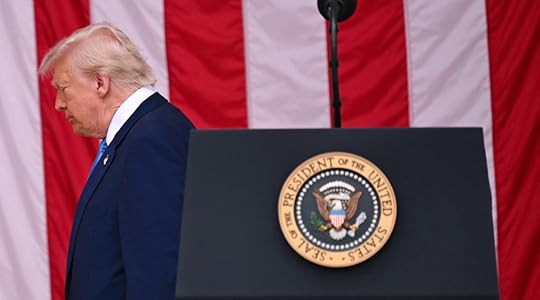Stuart Jeanne Bramhall's Blog: The Most Revolutionary Act , page 66
May 30, 2025
Russian MP Lays Out Terms for YouTube’s Return
 FILE PHOTO. © Getty Images / ozgurdonmaz
FILE PHOTO. © Getty Images / ozgurdonmazRT
YouTube can only resume full operations in Russia if it fulfills a series of legal and technical conditions, State Duma member Anton Nemkin has told RIA Novosti.
Although not officially blocked, YouTube has been largely inaccessible in Russia since last year, when its loading speed began slow dramatically. Authorities blamed a lack of server maintenance following Google’s exit from the country in 2022. Later, officials partially confirmed the slowdown was also linked to YouTube’s failure to comply with Russian law.
Nemkin said on Friday that YouTube needed to deal with abandoned equipment, settle outstanding fines, and establish a legal entity in Russia before the platform’s functionality in the country can be fully restored.
The MP also called on YouTube to restore access to blocked Russian accounts. The platform has removed some media outlets, including RT and Sputnik, and has repeatedly taken down channels run by Russian bloggers, journalists, and artists. Moscow says the removals target content that reflects views diverging from those prevalent in the West.
“Without these steps, it’s impossible to speak of any ‘easing’ – this is not about politics, but legal compliance,” Nemkin said.
In March, it was reported that Russian-registered Google LLC owed national broadcasters $1.16 quintillion in fines for failing to restore their YouTube channels. In January, RBK said the international Google corporation owed more than $22 undecillion. The Kremlin described the figures as symbolic, intended to pressure the company into complying with Russian law.
Nemkin said dialogue with global platforms such as YouTube could only happen on Russia’s terms. “This is not about bans for the sake of bans, but about equal rights,” he said, adding that companies must comply with local laws, pay taxes, and store user data in Russia.
The lawmaker called for an end to the era of unchecked power for major IT companies. If foreign platforms are restored, “there is no going back to the old dependence.”
“We’ve learned a harsh but valuable lesson: we cannot build our digital future on platforms that can flip the switch at any moment,” he said, adding that YouTube should no longer serve as the foundation of Russia’s internet landscape.
Nemkin pointed out that Russia is now developing its own infrastructure – search engines, cloud storage, video hosting, and ad systems – in support of its “digital sovereignty.”
[…]
Via https://www.rt.com/russia/618354-russia-youtube-return-terms/
May 29, 2025
Tent City USA
Tent City USA
Directed by Aleksey Braznikov 2014
Film Review
In 2014 when this film was made, Lakewood New Jersey’s Tent City was 7 years old and one of the largest on the East Coast. Although most of its residents worked full time, their incomes were too high to qualify for either welfare or subsidized housing (most qualified for $50 in food stamps). One of their residents was a textiles manager for 30 years before her job was outsourced to China.
The tent city was run by a minister who quit his full time (and became homeless himself) to run the Tent City and distribute food and second clothing to poor communities throughout Lakewood. Another homeless man who lived in his car used his VA pension check to pick up free unsold pizzas from pizza restaurants and free nearly expired groceries from supermarkets.
After years of harassment (with the police giving residents tickets for using their wood stoves), in 2010 the city of Lakewood sued the homeless people in Tent City. The latter found a law firm who donated $1 million in pro bono services defending them. In a settlement, the city agreed to a consent order providing one year subsidized housing for everyone in Tent City. The social services worker who places most of them says his agency is trying to teach them to mobilize to meet their own needs. After a year if they can’ organize their own housing they will be out on the street again.
This clearly doesn’t address the problem faced by Tent City residents who already have full time jobs.
The filmmakers follow several Tent City residents into their new accommodations. One woman nearly loses hers when she can’t get a bank account to deposit her Social Security check. For some reason, the Social Security Administration refuses to replace her lost Social Security card.
The Tent City camp is allowed to stay open for a year in case former residents lose their housing. Many former Tent City residents return to Tent City for food because their food stamp allowance is inadequate to purchase three meals a day.
Trump Fires 100 National Security Council Members After Rice’s Comments Expose Deep State Rats

By Anne Stossel
President Donald Trump sent shockwaves through Washington last Friday, firing 100 National Security Council (NSC) members in a bold move that underscores his unrelenting battle against the so-called “deep state.” The purge came after former Obama-era National Security Advisor Susan Rice appeared on MSNBC, spilling details of Trump’s classified intelligence briefings—details she shouldn’t have had access to, given her revoked security clearance and departure from government months ago. For Trump and his loyalists, this was the final straw, exposing a nest of disloyal bureaucrats within the NSC who were feeding sensitive information to the wrong hands.
The drama unfolded when Rice, a longtime Trump critic, casually revealed on air that she now receives weekly updates on NSC activities, a bombshell that confirmed the president’s long-held suspicions of internal sabotage. A White House official, speaking anonymously, told Amuse that Trump realized the NSC was a sieve, leaking his briefings to the media through Rice, who “basically ran Biden’s White House” during her tenure. The president acted swiftly, axing as many as 100 council members in what some are calling the most significant housecleaning of his second term.
This isn’t Trump’s first rodeo with the NSC. Earlier this year, in April, he sent 160 nonpolitical detailees back to their home agencies, aiming to realign the council with his America First agenda. The NSC, once bloated with 395 staffers during his first term, has been a thorn in Trump’s side for years, often packed with careerists who resisted his policies. Secretary of State Marco Rubio, who has doubled as acting national security adviser since Mike Waltz’s departure, has been instrumental in this overhaul, shrinking the council’s size and shifting power to the State and Defense departments. Rubio’s influence, backed by Trump’s trust, has been key to rooting out what the administration sees as entrenched opposition.
[…]
After Backlash, White House Prepares Appropriations Bill to Codify some DOGE Cuts

An online pressure campaign aimed at “codifying” the DOGE cuts is taking shape. The number of X posts mentioning “codifying” has jumped from around 1,000 five days ago to 25,000 on Tuesday.
RT
The big question in recent weeks: Why are House Republicans hesitating to codify the waste and fraud identified by Elon Musk’s Department of Government Efficiency (DOGE) into law?
Musk’s CBS News interview on Tuesday, where he called the “Big, Beautiful Bill” (BBB) a “disappointment,” appears to have kicked off a broader information campaign aimed at pressuring the White House to push House Republicans toward formally codifying some DOGE-related spending cuts.
By Wednesday afternoon, Politico reported, citing two anonymous Republican sources, that the White House plans to send a rescissions bill (appropriations bill) to Congress next week to formally propose the spending cuts.
The package is expected to target funding for NPR, PBS, and certain foreign aid agencies previously reduced under President Trump.
Here’s more from the report:
The package set to land on Capitol Hill is expected to reflect only a fraction of the DOGE cuts, which have already fallen far short of Musk’s multi-trillion-dollar aspirations. The two Republicans said it will target NPR and PBS, as well as foreign aid agencies that have already been gutted by President Donald Trump’s administration.
House Speaker Mike Johnson stated that the House is “eager and ready” to act on the DOGE findings, while Senate Majority Leader John Thune and others voiced frustration over the delay.
A growing online campaign, led by supporters of Musk, including Sen. Mike Lee and Gov. Ron DeSantis, is pressuring the administration to codify more of the DOGE cuts.
Sen. Ron Johnson blamed House Republicans. However, the path forward remains uncertain due to the opposition of 26 Senate Republicans.
[…]
US Federal Court Blocks Trump’s Sweeping Tariffs in Legal Blow To Trade Policy

US President Donald Trump steps away from the podium in the amphitheater at the Tomb of the Unknown Soldier in Arlington National Cemetery in Arlington, Virginia, on Memorial Day, May 26, 2025. (Photo by AFP)
Press TV
A US federal court has ruled illegal President Donald Trump’s sweeping tariffs, delivering a significant blow to one of his administration’s central economic policies.
A three-judge panel at the New York Court of International Trade issued the decision following multiple legal challenges that contended Trump overstepped his presidential powers, making US trade policy subject to arbitrary presidential decisions and causing global economic instability.
While tariffs generally require congressional authorization, Trump circumvented this by claiming that the country’s trade deficits amounted to a national emergency. This unprecedented justification enabled him to unilaterally impose far-reaching tariffs on nearly all US trading partners last month – a sudden decision that triggered significant market volatility.
The judicial panel emphasized they were not evaluating “the wisdom or likely effectiveness of the president’s use of tariffs as leverage,” but rather assessing the legality of the tariffs’ implementation. As the ruling clarified, the tariffs were struck down not because such use is unwise or ineffective, “but because [federal law] does not allow it.”
The ruling additionally halted a distinct series of tariffs the administration had placed on China, Mexico, and Canada – measures originally justified as combating drug trafficking and illegal immigration into the United States.
The court’s decision did not, however, extend to tariffs targeting particular imports such as automobiles, steel, and aluminum, as these were authorized under separate legal provisions.
The Trump administration is expected to challenge the court’s decision, with White House officials rejecting the judiciary’s intervention. “It is not for unelected judges to decide how to properly address a national emergency,” White House spokesperson Kush Desai told Reuters in a formal statement.
 Dozen US states sue Trump government over ‘insane, reckless’ tariff policy
Dozen US states sue Trump government over ‘insane, reckless’ tariff policyA dozen US states have taken legal action against the Trump administration over President Trump
On April 2, Trump implemented a historic worldwide tariff system, introducing import duties affecting nearly all US imports.
The policy established a standard 10% tariff for most nations, while applying higher retaliatory rates to multiple countries and economic unions – including the European Union, United Kingdom, Canada, Mexico, and China.
Trump’s administration says the tariffs would create manufacturing jobs at home and open up export markets abroad, though officials cautioned it would take time to see results.
[…]
CIA running out of international informants and spies
 FILE PHOTO: The seal of the US Central Intelligence Agency. © Igor Golovniov / SOPA Images / LightRocket via Getty Images
FILE PHOTO: The seal of the US Central Intelligence Agency. © Igor Golovniov / SOPA Images / LightRocket via Getty ImagesRT
The CIA is grappling with difficulties in recruiting foreign informants and “needs more spies,” The Washington Post reported on Wednesday, citing current and former intelligence officials.
Chief among the problems the sources listed is the global proliferation of public surveillance systems and advances in facial recognition, which make it harder for operatives to avoid detection.
CIA Deputy Director Michael Ellis acknowledged the issue in a recent public interview, saying that although “some of the tools and techniques from the 1960s or ‘70s might still work today, a lot of them need to be updated and refreshed.”
Other officials pointed to past setbacks, according to the WaPo, including the agency’s aggressive recruitment of Chinese officials in the early 2000s. Beijing’s security forces later dismantled that network, reportedly imprisoning and executing up to two dozen CIA assets.
The COVID-19 pandemic also hindered operations, the report said, by disrupting face-to-face meetings with informants due to lockdowns and travel restrictions. US President Donald Trump’s current plan to close 10 embassies and 17 consulates as part of budget cuts threatens to further reduce the CIA’s footprint globally.
In an effort to attract defectors, the CIA has produced what the reports described as “Hollywood-quality” videos targeting Russian and Chinese audiences, which have been distributed via social media. While officials told the Post that some Russians have responded, they declined to provide specifics.
The ads sparked incredulity in both countries and parodies that reversed the agency’s message by highlighting American problems.
Domestically, the CIA’s recruitment of new agents has declined by double-digit percentages since 2019, a former official told the Post. The newspaper noted that a recent directive from the White House that led to the circulation of an unclassified list of new hires — including first names and initials — could impact morale and security.
In 2021, the agency was ridiculed for a recruitment video featuring a “cisgender Millennial who has been diagnosed with generalized anxiety disorder.” Ellis said the current leadership is focused on building “the ultimate meritocracy at the CIA.”
[…]
Via https://www.rt.com/news/618306-cia-recruitment-problems-wapo/
Ukraine Training Terror Groups in Africa
 Tatyana Dovgalenko, deputy director of the Russian Foreign Ministry’s Department for Partnership with Africa. © Sputnik/Vitaly Belousov
Tatyana Dovgalenko, deputy director of the Russian Foreign Ministry’s Department for Partnership with Africa. © Sputnik/Vitaly BelousovRT
Arms provided to Kiev by Western allies are being transferred to groups destabilizing the Sahel region, according to a Russian Foreign Ministry official
Ukraine is training jihadist fighters and supporting terrorist groups in Africa’s Sahel region, a Russian Foreign Ministry official has said, accusing Kiev of funneling Western-supplied weapons to militants operating across the continent.
Tatyana Dovgalenko, deputy director of the Russian Foreign Ministry’s Department for Partnership with Africa, made the remarks on Thursday at the 13th International Meeting of High Representatives for Security Issues in Moscow. Representatives of 104 countries, including African delegations, have gathered at the event to discuss a new global security architecture.
“The Kiev regime continues systematic efforts to destabilize the continent, collaborating with terrorist networks in the Sahel, particularly by training and organizing militants,” Dovgalenko said, according to TASS.
“There is evidence that the arms delivered to Ukraine by Western states are being transferred to terrorist factions operating in various global regions, including Africa,” she added.
Moscow has made terrorism and counter-extremism a central focus of its security cooperation with African states, particularly those in the Sahel, which have been embroiled in a decade-long jihadist insurgency.
Dovgalenko noted that terrorist groups have adapted to modern technologies and shifting counterterrorism strategies, warning that nearly 60% of global terrorism deaths in 2024 occurred in Africa, with the Sahel accounting for 20% of the continent’s attacks.
Ukraine has been at the center of a growing diplomatic storm in the Sahel region since an ambush by Tuareg rebels in July 2024 left dozens of Malian soldiers and Russian Wagner Group contractors dead. Reports have claimed that Ukrainian military intelligence supplied information used in the deadly attack.
Moscow and the Alliance of Sahel States made up of Burkina Faso, Mali, and Niger have jointly denounced Kiev’s “criminal alliance” with extremist groups. Russian Foreign Minister Sergey Lavrov earlier accused Ukraine of openly abetting terrorists in the region.
Mali cut diplomatic ties with Ukraine in August. Niger followed suit shortly afterwards, with Burkina Faso later confirming its relations with Kiev were effectively frozen. Ukraine has denied the allegations.Last month, Malian Foreign Minister Abdoulaye Diop said Kiev must be held accountable for fueling instability in Africa, which has resulted not only in the deaths of Malian soldiers but also in civilian casualties.
The West African regional bloc ECOWAS, which Mali, Niger, and Burkina Faso officially quit in January, also warned against “foreign interference” that threatens the region’s peace and security.
In a speech on Wednesday marking 50 years since the group’s formation, ECOWAS Commission President Omar Alieu Touray identified terrorism as one of the “formidable” challenges facing the community and called for collective efforts to address the crisis.
[…]
Via https://www.rt.com/africa/618314-ukraine-training-terror-sahel-region-terror-groups/
May 28, 2025
US Military Command Could Exit Africa
 © Facebook/U.S. Africa Command (AFRICOM)RTThe move comes months after the Pentagon was forced to withdraw its troops from the
© Facebook/U.S. Africa Command (AFRICOM)RTThe move comes months after the Pentagon was forced to withdraw its troops from theWashington’s Africa military command (AFRICOM) has announced plans to reassess its presence on the continent, as countries increasingly rethink defense ties with the West and shift alliances.
AFRICOM commander General Michael Langley told reporters in Kenya’s capital, Nairobi, on Tuesday, that he had already discussed the matter with several African defense ministers and heads of state.
“I’ve talked to a number of ministers of defense and a few presidents and told them we were assessing,” Langley said, according to Reuters.
“That’s what I tell them… if we’re that important to [you], you need to communicate that and we’ll see,” he added.
The move follows reports in the US media that President Donald Trump’s administration is considering merging AFRICOM with Washington’s European Command in Stuttgart, Germany, citing potential efficiencies.
AFRICOM was established in 2008, ostensibly to consolidate US military efforts on the continent and offer a response to growing security concerns, including Islamist insurgencies. However, its influence has declined in parts of Africa.
Washington had previously insisted on finding a way to maintain its military presence in the region despite being ordered to remove its forces from significant areas, including key Sahel states – Niger and Chad.
Last September, the Pentagon completed the withdrawal of assets and approximately 1,000 troops from a $100 million base in Niger, following a request by the West African country’s government, whose military leadership cited the contingent’s failure to curb jihadist militants in the Sahel.
The US Department of Defense also withdrew around 70 personnel from an air base near N’Djamena, the capital of Chad – America’s only military site in the country – after receiving a similar request from Chadian authorities.
Despite recent setbacks, Reuters quoted Langley as saying that the US continues to maintain some intelligence-sharing arrangements with military regimes in the Sahel and is exploring “other ways to continue to stay engaged.”
France has also been forced to withdraw from Burkina Faso, Niger, and Mali, as the governments in those countries pursue alternative alliances, including closer ties with Russia.
[…]
Via https://www.rt.com/africa/618259-us-reviews-africa-military-command-role/
The WHO Pandemic Treaty: What It Means for Canada
Following three years of negotiations, the World Health Organization (WHO) has formally adopted a legally binding agreement aiming to improve member countries’ pandemic preparedness and response.
The Pandemic Agreement requires Canada to carry out actions like strengthening disease surveillance, improving its health-care system and supply chain for pandemic-related health products, and ensuring drug manufacturers set aside vaccines and therapeutics for developing countries.
The treaty does not give the WHO the power to direct Canada to carry out measures like travel bans, lockdowns, or vaccine mandates. The agreement also allows for Canada to back out of it two years after it officially comes into force.
The treaty was adopted on May 20, with 124 countries voting in favour, including Canada. No countries formally objected to the pandemic treaty, but 11 countries abstained from voting.
Some of the countries that abstained from the vote, like the United States and Slovakia, have publicly criticized the pact. U.S. Health Secretary Robert F. Kennedy Jr. issued a statement on the day the pandemic treaty was adopted, saying the United States would not participate in the pact because the WHO “has not even come to terms with its failures during COVID, let alone made significant reforms,” and that the agreement “will lock in all of the dysfunctions of the WHO pandemic response.”The United States had also gone a step further to disengage from the WHO, starting the process to formally leave the organization shortly after U.S. President Donald Trump returned to the White House in January.
The pandemic pact will not officially enter into force until a system on sharing pathogenic information is completed, after which 60 countries must ratify the agreement for it to come into force.
[…]
Via https://www.globalresearch.ca/who-pandemic-treaty-canada/5888382
May 27, 2025
Bill Proposes Ban on Congressional Stock Trading

Doug Goldsmith
U.S. Senator Mark Kelly from Arizona has put forward a bill that aims to put an end to congressional stock trading. This legislation, known as the Ban Congressional Stock Trading Act, would require all members of Congress, along with their spouses and children, to place their stocks into a blind trust or sell them off. Kelly’s office insists this move is necessary to prevent any use of insider information for personal gain.
Kelly emphasized that as Americans struggle with rising living costs, they should not have to worry about their elected officials making money through insider trading. He was clear in his statement, “The only way to stop insider trading in Congress is to stop members of Congress from trading stocks. Period.” Kelly seems confident that the American public is on his side with this issue.
Backing up his stance, Kelly referenced a survey conducted by the Program for Public Consultation at the University of Maryland. The survey found that a staggering 86% of Americans support such legislation. This includes a solid majority across political lines: 88% of Democrats, 87% of Republicans, and 81% of Independents.
Kelly is hopeful that this bill will help restore trust in the government and address some of the issues plaguing Washington. Senator Jon Ossoff from Georgia has also taken up the cause, introducing the bill alongside Kelly. Ossoff pointed out that members of Congress have unique access to confidential information, which they could potentially exploit for financial gain.
[…]
Via https://libertyonenews.com/bill-proposes-ban-on-stock-trading-for-congress-members/
The Most Revolutionary Act
- Stuart Jeanne Bramhall's profile
- 11 followers




